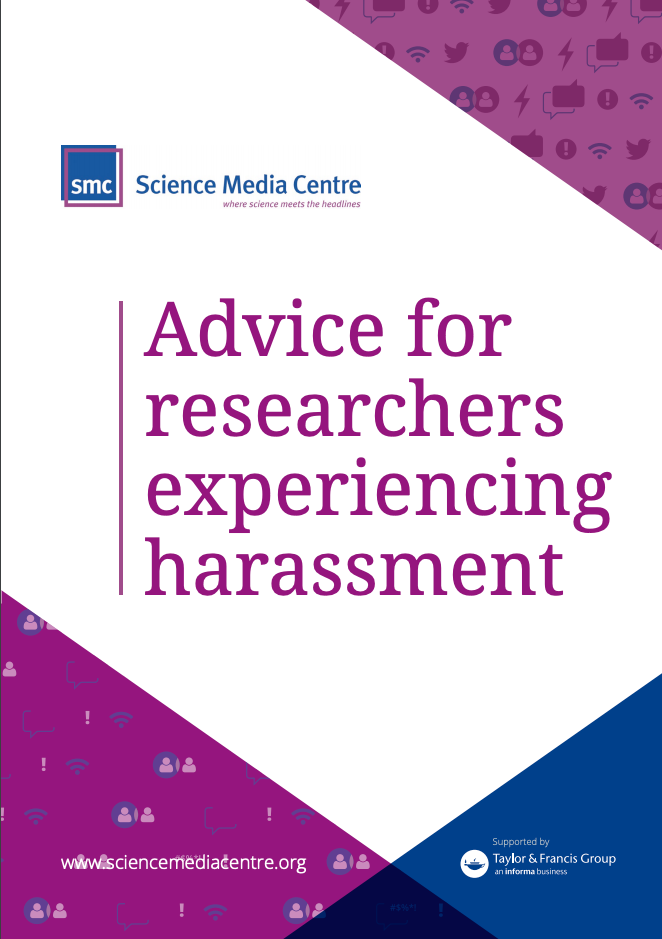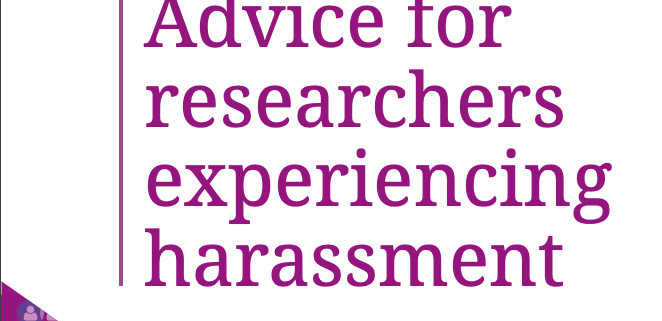Science Media Centre (UK) offers guide on dealing with online harassment in academia
Advice for researchers experiencing harassment is a useful guide for science researchers who experience trolling, abusive emails or other acts of hostility from people who represent extreme views.
Especially if you’re a professional in a field that attracts controversy (vaccination, climate change, radioactivity, animal research, etc.) you may be the target for harassment. The organization Science Media Centre, supported by Taylor & Francis, recently published an updated version of their guide for researchers on how to deal with such situations.
Crastina got in touch with Sabina Alam, Director for Publishing Ethics and Integrity at Taylor & Francis, for some email questions.

Hi Sabina! Please tell us a little about the guide offering support and advice to researchers experiencing harassment.
Researchers sometimes find themselves in an unfortunate position of having their research findings represented as something negative or suspicious, or face accusations from people who don’t agree with the nature of their research. Researchers can sometimes find themselves confronted in person by accusers, but another form of harassment has been growing via the internet/social media platforms. One of the reasons for this is it’s easier for accusers to hide behind aliases, or to spread misinformation to gather support from others.
Researchers, therefore, need to be supported in how to deal with the situation if they find themselves on the receiving end of this and it’s important that we support them in this by providing some practical tips. One thing the guide points out is that those with extreme views about the research are often part of a minority with a loud voice, whereas supporters of the research are part of a silent majority. It’s important to keep this in perspective.
When was the initiative to produce the guide taken, and why?
The guide has been available for a few years now, and we’ve always found it a really helpful resource to direct researchers to. However we’ve noticed a significant shift recently in the types of concerns researchers have, and the way that harassment can quickly escalate and spin seemingly out of the individual’s control or influence.
The common factor in all of this seems to be the increased use of social media as a channel for open discussion and debate about research. This has a lot of positive benefits of course, with researchers able to disseminate and connect with readers about their research from their own desktop. But equally this accessibility means researchers can be on the receiving end of direct and personal harassment in a form that just wasn’t so immediate in previous years. We feel it’s important to acknowledge this and make sure that guidance is available which equips researchers to better prepare if they find themselves in this position.
Please give some examples of typical situations of the kind which the guide addresses.
Researchers using animal models as part of their studies, or involved in areas of potentially controversial research (e.g. gender studies, politics, vaccine research, CFS/ME, climate change etc).
How can the research community act to protect its members from these kinds of situations?
Training for researchers should be provided regarding how to communicate their work, including how to recognise risk and manage hostile/leading questions. It’s also important to support researchers in keeping perspective to ensure they communicate with the whole research community rather than just taking a defensive stance against those who are harassing/accusing them. Keep the debate scholarly and evidence-based and refrain from any personal attacks. Taking the higher ground is harder, but will save a lot of additional problems down the line.
Please give three pieces of advice to the early career scientist who experiences harassment of some kind!
- Firstly to stay calm and fight any instinct to respond immediately. Being faced with harassment is an unnerving experience but it’s important to make a considered response rather than a rash one.
- Secondly, know who your support network is – your institution, the editor/publisher of the journal which published your research, your colleagues, etc and seek advice and support from them.
- Thirdly, it’s important to have a plan in place – i.e. present your response (keep it scholarly in tone and evidence-based) and know when to stop responding so that you don’t end up in an endless circle of defensive answers.
Taylor & Francis Group is a leading publisher of scholarly journals, books, and reference works. Taylor & Francis Author Services is ‘supporting researchers from initial idea, through peer review, production, publication and beyond.’
The Science Media Centre is an independent charity and company with a mission to ‘provide, for the benefit of the public and policymakers, accurate and evidence-based information about science and engineering through the media, particularly on controversial and headline news stories when most confusion and misinformation occurs.’
- Claire Price of Crastina receives outreach award from Royal Society of Biology - October 25, 2020
- Agile Science student project at Brussels Engineering School ECAM: “We can’t wait to try it again!” - August 28, 2020
- Create an infographic in the Lifeology SciArt Infographic Challenge - June 16, 2020
- Adam Ruben – The scientist that teaches undergraduate students comedy - March 27, 2020
- Sam Gregson, Bad Boy of Science: “Comedy helps to bridge the gap” - March 10, 2020
- The Coolest Science Merchandise of 2019 - December 16, 2019
- Science Media Centre (UK) offers guide on dealing with online harassment in academia - November 26, 2019
- Agile project management taught to students and researchers at Karolinska Institutet - September 20, 2019
- Stefan Jansson: Improve your credibility! (Crastina Column, September 2019) - September 6, 2019
- The People’s Poet: Silke Kramprich, tech communicator - August 31, 2019





Leave a Reply
Want to join the discussion?Feel free to contribute!